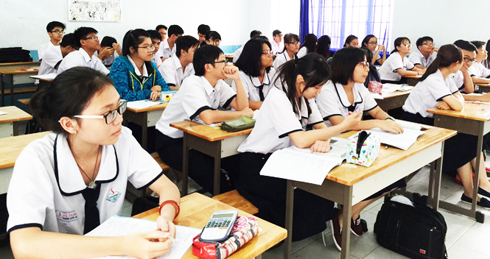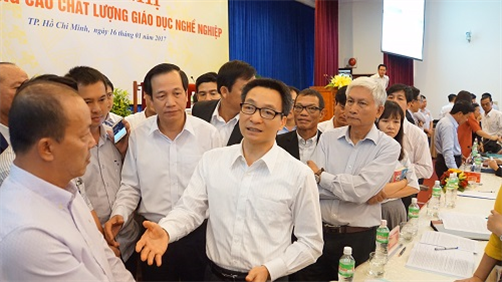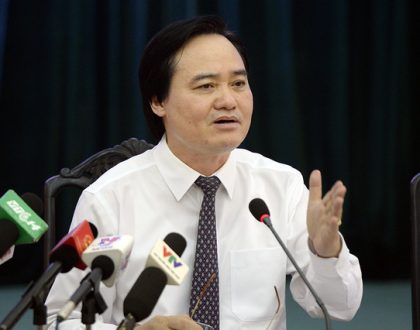The lowest primary school teacher salary coefficient is 2.34; officially remove the requirement regarding language and information technology certificates for teachers at all levels.;... are some of the good news about salaries and qualifications for teachers in Vietnam at all levels in the near future.

In the near future, teachers in Vietnam at all levels will receive good news regarding salary and qualifications in Vietnam (Internet image)
1. Primary school teachers in Vietnam with standard qualifications will have the lowest salary coefficient of 2.34.
Specifically, according to Circular 02/2021/TT-BGDDT, starting from March 20, 2021, teachers who meet the new training level standards according to the regulations in the Law on Education 2019 (meaning having a university degree in teacher training or a university degree in relevant fields of study along with a pedagogical certificate for primary school teachers and above) will be applied the minimum salary coefficient of 2.34 for the professional title of Class III primary school teacher; 4.00 for Class II primary school teacher; and 4.40 for Class I primary school teacher.
>>See more HERE.
2. Many primary school teachers in Vietnam will have the highest salary coefficient of 6.78.
Specifically, according to Circular 02/2021/TT-BGDDT, starting from March 20, 2021, for primary school teachers who have a master's degree in teacher training for primary education or a master's degree in relevant fields of study for the subjects they teach, or a master's degree in educational management or above; and have held the professional title of Class II primary school teacher (code V.07.03.28) or equivalent for at least 6 years, if, until the deadline for submitting application documents for examination or promotion, they meet the professional ethics standards, training and development level standards, and professional competence for the professional title of Class I primary school teacher, they will be classified as Class I primary school teachers and will have the salary coefficient of civil servants in Group A2.1, with the highest salary coefficient being 6.78.
>>See more HERE.
3. Officially remove the requirement regarding language and information technology certificates for teachers at all levels as of March 20, 2021.
Specifically, according to previous regulations, teachers at all levels and professional titles in different regions were required to meet the language proficiency requirements from level 1 to level 3 (depending on the title and level) and the information technology proficiency requirements at the basic level of information technology skills. For secondary education, foreign language teachers must have a second foreign language proficiency level equivalent to the language proficiency level of other teachers.
However, in the 4 new Circulars issued on February 2, 2021 (Circular 01/2021/TT-BGDDT, Circular 02/2021/TT-BGDDT, Circular 03/2021/TT-BGDDT, Circular 04/2021/TT-BGDDT), the Ministry of Education and Training has removed the regulations on language and information technology proficiency, certificates of ethnic minority languages, as well as the requirement for a second foreign language proficiency for foreign language teachers in the training and development standards for teachers at all levels. Instead, the language and information technology proficiency requirements for teachers at all levels and professional titles have been adjusted to the standards of professional competence, with the content "being able to apply information technology in performing the tasks of kindergarten/primary school/junior high school/high school teachers according to each title and being able to use foreign languages or ethnic minority languages in specific assigned tasks".
Therefore, starting from March 20, 2021, candidates for appointment to professional titles of teachers or for promotion to professional titles of kindergarten, primary school, lower secondary school, and upper secondary school teachers will no longer need to have language and information technology proficiency certificates, but only need to have the ability to apply information technology in performing tasks and the ability to use foreign languages or ethnic minority languages in specific assigned tasks.
>>See more HERE.
4. Teachers at all levels will see a significant increase in salary according to the new training standards as of March 20, 2021.
Specifically, according to current regulations, the salary of teachers as civil servants will be paid according to professional title standards. New teachers entering the profession will have the lowest professional title, so the salary they receive will also be the lowest. The training level of kindergarten, primary school, and lower secondary school teachers has been raised, which serves as the basis for the salary scale for teachers at these levels.
For primary school teachers, the training level will be raised from intermediate to university level, so this is also the level where the salary changes the most. Currently, the initial salary scale for intermediate education is 1.86; for university education, it is 2.34; this has already shown a significant increase in the salary of primary school teachers. In essence, there are significant changes in the salary of teachers at all levels according to the new training standards in the 4 Circulars issued by the Ministry of Education and Training, as follows:
- Kindergarten teachers: The lowest salary coefficient increases from 1.86 to 2.10; The highest salary coefficient increases from 4.89 to 6.38.
- Primary school teachers: the lowest salary coefficient increases from 1.86 to 2.34; The highest salary coefficient increases from 4.98 to 6.78.
- Lower secondary school teachers: the lowest salary coefficient increases from 2.10 to 2.34; the highest salary coefficient increases from 6.38 to 6.78.
- Upper secondary school teachers: Remains stable as it is currently.
>>More details of the salary coefficients for teachers at each level and rank can be found HERE.
5. Teachers at all levels will continue to receive seniority allowances until the new salary policy is implemented.
Previously, on November 9, 2020, at the 50th Session, the Standing Committee of the National Assembly gave opinions on continuing the implementation of the seniority allowance policy for teachers to help them stabilize their lives and work with peace of mind until the new salary policy is implemented.
In accordance with the directions of Prime Minister Nguyen Xuan Phuc in the Official Letter 9903/VPCP-KTTH dated November 26, 2020, the Ministry of Education and Training drafted proposals to continue the implementation of the seniority allowance policy for teachers and sought opinions from 04 Ministries: Ministry of Home Affairs, the Ministry of Finance, the Ministry of Justice, the Ministry of Labor - Invalids, and Social Affairs.
Based on the opinions received from the relevant Ministries and to provide a basis for continuing the implementation of the seniority allowance policy for teachers in localities, on February 2, 2021, under the Official Dispatch 460/BGDDT-NGCBQLGD, the Ministry of Education and Training proposed: "The government issues a Resolution allowing the continued application of the seniority allowance policy for teachers as stipulated in Decree 54/2011/ND-CP dated July 4, 2011 by the government".
The new salary policy is expected to be implemented as of July 1, 2022. Therefore, from now until the implementation of the new salary policy, teachers at all levels will continue to receive the current seniority allowance policy.
According to the previous plan in Resolution 27-NQ/TW, the salary reform policy for officials, civil servants, and public employees was scheduled to be implemented in 2021. However, due to the overall impact of the COVID-19 pandemic, at the 13th Conference, the Central Party Committee of the 12th term agreed with the proposal of the Party's leadership and the Government regarding the timing of implementing the new salary system starting on July 1, 2022 (instead of 2021 as previously planned) for officials, civil servants, public employees, armed forces, and workers in enterprises according to Resolution 27-NQ/TW."
- Key word:
- teachers
- in Vietnam
 Article table of contents
Article table of contents














